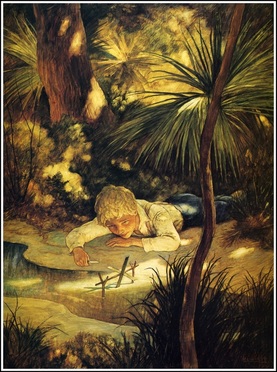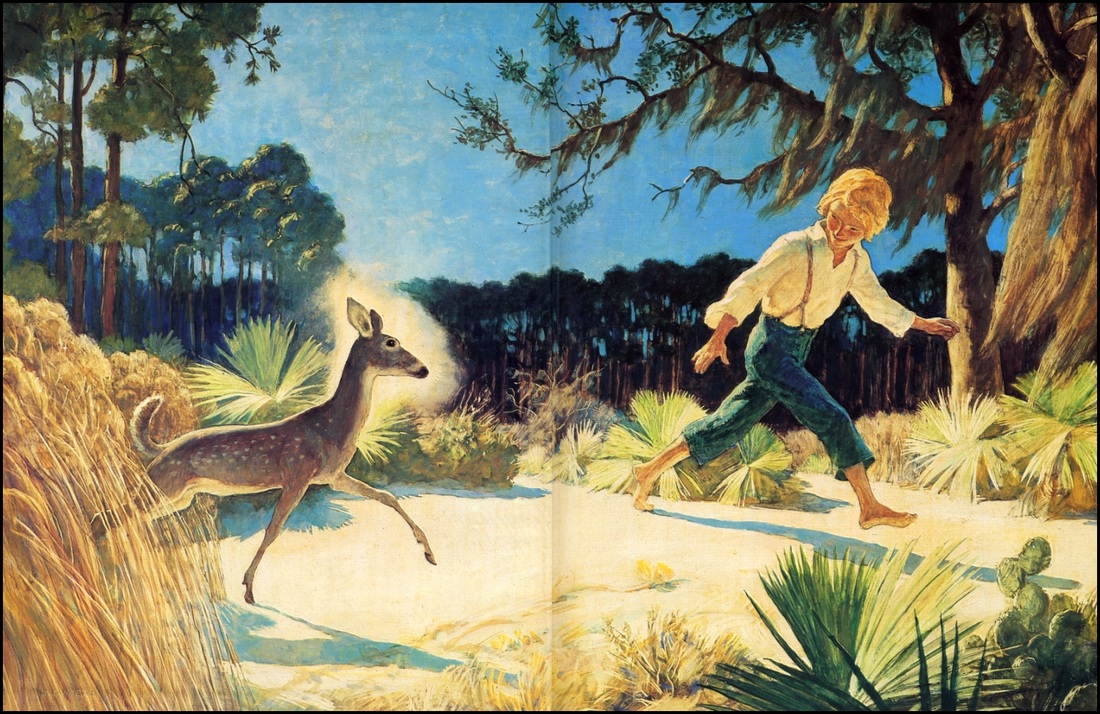 The Yearling by Marjorie Kinnan Rawlings and illustrated by N.C. Wyeth was given to me, by my mother for Christmas in 1991. I was 10 years old, and loved the story for its soft, slow understanding of nature and the South. I knew it to be a tale of growing up, a child's loss of a yearling deer, and the theme being that one cannot be an adult without surviving a permanent and unfair loss. My memories of the work consisted of the image of Jody, a pre-teen boy and his flutter mill he would make and lazily gaze at. Also, an understanding that a pet was killed, similar to Old Yeller. But re-reading the work as an adult, it struck me how sad the story is. Perhaps children are more likely to withhold an immunity to sadness as people and situations are seeming to pass by uncontrolled and unquestioned. Though, at the time I read the story, I was not a stranger to death. Nor without a respect for nature. As a little girl growing up in West Africa, I knew death more personally than is usual for Western culture. This may be because while the family resided in the Gambia, my father was given the gift of a grown ram by the natives. He came to us on a white flat bed truck, the natives sitting there holding him, their legs dangling over the side. My mother moaned and complained through puffs of endless cigarette that if they wanted to give my father a gift, which was sweet enough, then why not a canary? Or something manageable within a cage? He ran about our orchid, among the orange trees and would ram people. I christened him Ramsy. And so Ramsy he was. After he had thoroughly bruised my mother with me behind her, and my girlfriends and I (along with everybody else) would walk about the orchid in fear of being plowed down, it was decided perhaps a ewe would be of benefit to him. So, Ramsy was given Sparkle (I named her as well, it was the mid 80s), a matching gift from the staff. Ramsey chased Sparkle around and around the orchard. I remember Sparkle running as fast as she could, along the hollowed brown gate surrounding the orchard with its trees of lemon, grapefruit, cashew nut and orange. Behind her would be Ramsy. Sparkle was pregnant soon enough. Then one morning, I walked out to the orchard, in those pinafore dresses they had with the elastic over the front in an empire waste fashion. It was the dry season as the day was filled with a hot golden sunshine, and a sticky scent of citrus and African earth waved through the air. The gardner was digging a very large rectangle. Next to the grave lay Sparkle. There was blood and I remember the sweet, pungent smell of death. The gardener told me she had been too young. I knew what he meant. The lamb had not survived either. So, I knew death. To know someone who has died and to know death are two different things. I felt sad and it felt unfair, but I did not deeply mourn for Sparkle. I had never loved her. In the West, death is clean. Death is somewhere else. But not in Africa. The next day, I came back to the grave. Fresh earth had covered the scent of demise and the newly laid, broken ground held a silence unto itself. There was one moment when I did mourn. It was years later, and my best friend Karine and I were on the beach of Conakry, Guinea. It was a rocky, polluted area that we were forbidden to go. But being eight year old girls, Karine and I somehow, never always listened to what we were told to do. It was not dirty in the sense of trash strewn everywhere, but the water was not clean enough to swim in. We walked along, and talked and as it began to rain, I noticed a large grey dog. He looked like an Irish Wolfhound. The tide was rising and the dog was on a tiny island of rocks, between the waves and the shoreline. The waves grew higher and began to wash over the dog's legs. At this time there was a group of school aged boys. They were throwing stones at the dog. Big ones. I shouted at them to go away. They ignored me. They were told by Karine, to go. The waves were getting even higher and the rain came down. The sky was as grey as the dog. Then, my heart dropped into the bottom of my stomach as I realized they were going to kill it. I could hear the hollowed sound of the rocks hitting the dog and saw the waves washing over it. I ran across the soft purple-grey stones of the beach, through the black back yard gate and around the side of the bungalow crying, back to the servants of my friend as they were sitting in the garden shaded from the rain, and begged them. Go they are killing the dog. Please go. I pointed as the crow flies, back to the ocean, to where the adults should be to make it better. They laughed at me. "Look at that white girl caring for a dog," Karine's maid said, as she bent over in hysterics. My utmost tragedy was their comedy central. Nothing. I returned to the beach on my own. Karine was still there. She was stoic. There was no dog now. Karine said he had gotten to shore but they kicked him back, a couple of times. I walked the shoreline and I could swear I heard a sad whine that was not of the waves. But I could not find the dog. Karine's father returned and wanted to know, what she and I were thinking going to the beach on our own in the first place. We had always been forbidden to do this. But we had. And I mourned that dog's death more than I had ever mourned anything. It was not natural. There was no need for it. The shore had been right there. The dog could swim just fine. The servants were in trouble, as well for their response. But this time, there was no earth to cover. There was no comfort of an objective gardner to give to a little girl. The waves would take the dog with them in time. Our family's maids would laugh at me for how much I could eat, as I would come to the kitchen for meals so often I could have been a cartoon character. But that evening, I had no appetite. I could not stop hearing the gasping, dying whine and the sound of the relentless ocean waves, oblivious salty waters. I stared down at my dinner as if I had never seen food before, and tried not to cry. After dinner, my mother took me in her lap and said, in between puffs of cigarette, "It is a harsh country that makes for hard people and the animals fare no better." I understood her logic, but it brought little comfort. (The life expectancy for the average Guinean at the time was 42 years at the most). Yet that night, I was given Henry and Ribsy by Beverly Cleary, among a pile of books we had recently gotten. It was an old library copy with a yellow cover and the picture of a dog with a boy, in 1950s style illustration. Ribsy is a worn down dog, whose ribs show and he is found and given a home by Henry. I devoured that book. Curled up on the couch, the world regained order. Two years later I was given The Yearling for Christmas. And as melancholy as losing that grey dog was, The Yearling is sadder. It knocks Black Beauty out of the park. It's as if there is some unspoken rule that a tale must never be too tragic. There are tragic characters, but they are rarely the main ones. Rawlings ignores this rule and she provides no answers as to why. Perhaps this is what granted the novel its popularity, for whatever a person may have been through in life, The Yearling is somehow sadder. As an adult I realized how much loneliness centered within the lives of all Rawlings' characters living within the world of late 1800s northern Florida. A country of farmers and hunters who live off the land, but not with it. Man is an animal with a gun in a spanish moss decorated forrest filled with wild life. Jody Baxter, is part of this setting. He goes to the creek and makes a flutter mill upon the shallow, slow moving waters. He lives in a small three room house, with his father, Penny and his mother, Ory. Penny is smaller than Ory, and why he choose her for a wife is not certain, but he did: "Sich doin's! Nobody acted that-a-way when I were a gal." "No," Penny said, "I was the only one wanted you." She lifted the broom in pretended threat. "But sugar," he said, "the rest just wasn't smart as me." Ory lost a few children to rural living and the travails of the time. But Jody survived. A wide eyed boy with one friend, Fodder-wing Forrester, a neighbor who is a cripple and dies, but not before naming Jody's new found friend and playmate, Flag. Penny was bit by a rattle snake while on a hunt, and he lives by shooting a doe, cutting out her organs and using them to draw poison from his own blood. The doe had a fawn who becomes Jody's Flag, as his white turned up tail is like a flag. The Baxter's home is sparse, but Jody has never been starved. Never beaten. He goes on hunts with Penny and learns the ways of farming. The men all live bound on what nature provides. If they need to eat they go out and hunt. But they also hunt for sport. As if all that is natural will always come out of nowhere, continuously and forever. Men are animals competing with animals for food and space. But men have guns they can kill easily and repeatedly with in a way other animals cannot do to them in turn. Jody, sensitive and thoughtful, is raised to be a man such as these men. There are no other examples. Penny, is better than most and contemplates unnecessary killings of wolves, but in the end he helps to kill off the last wolf himself so as not to be outdone by neighbors, who kill and capture at will and for profit. Jody's best friend is Flag. The two play together and wherever Jody is, there is Flag to be found soon enough, prancing along and butting his un-horned head at imaginary enemies. Both are yearlings, growing up side by side. But there are premonitions that Flag's life is in jeopardy when it becomes clear he does not understand the difference between forrest foliage and the Baxter's plantings. The Baxter's survive on their crop. Hours and days of labor go into their yield. And when Flag% |
Archives
June 2017
Categories
All
|

 RSS Feed
RSS Feed